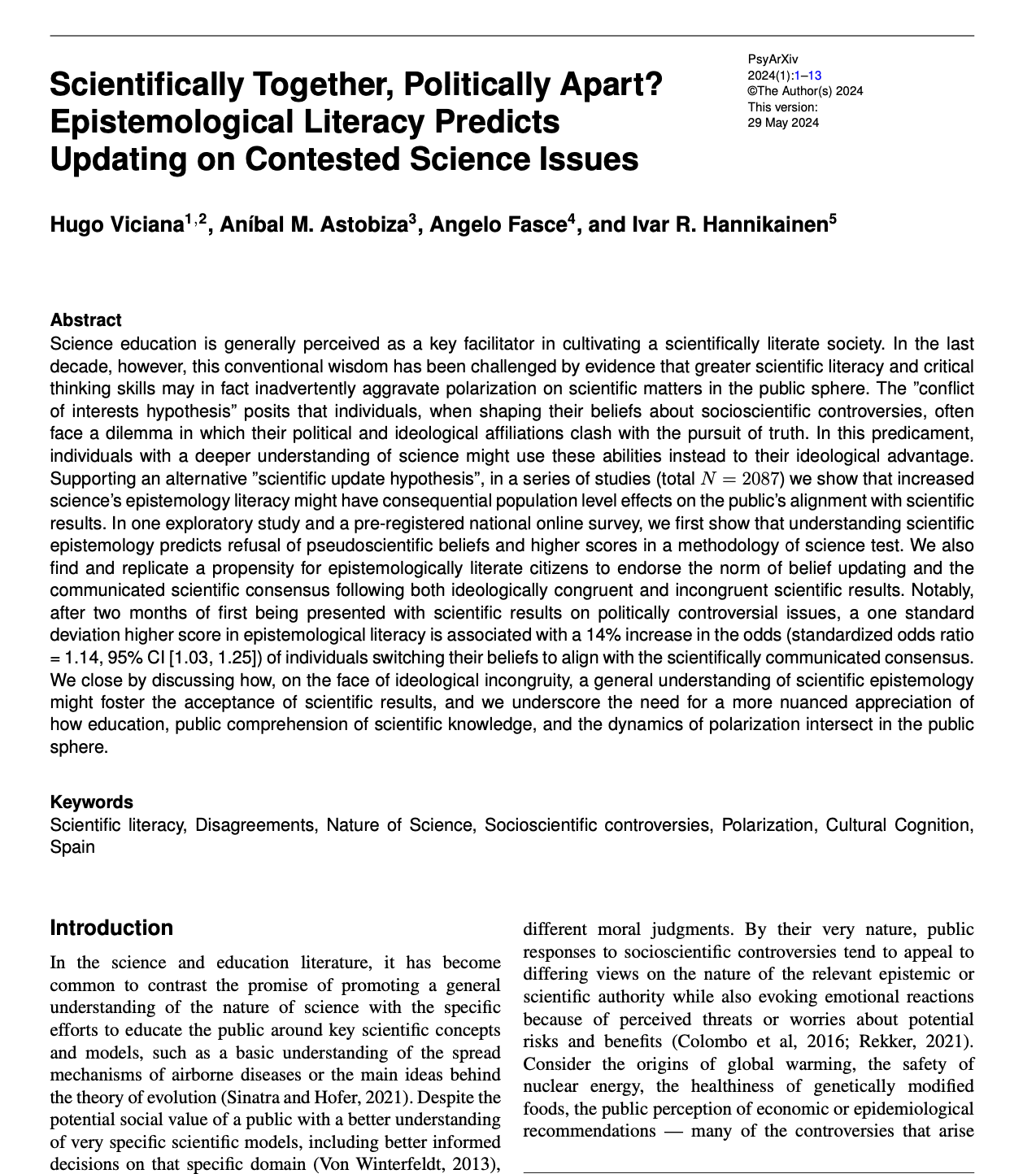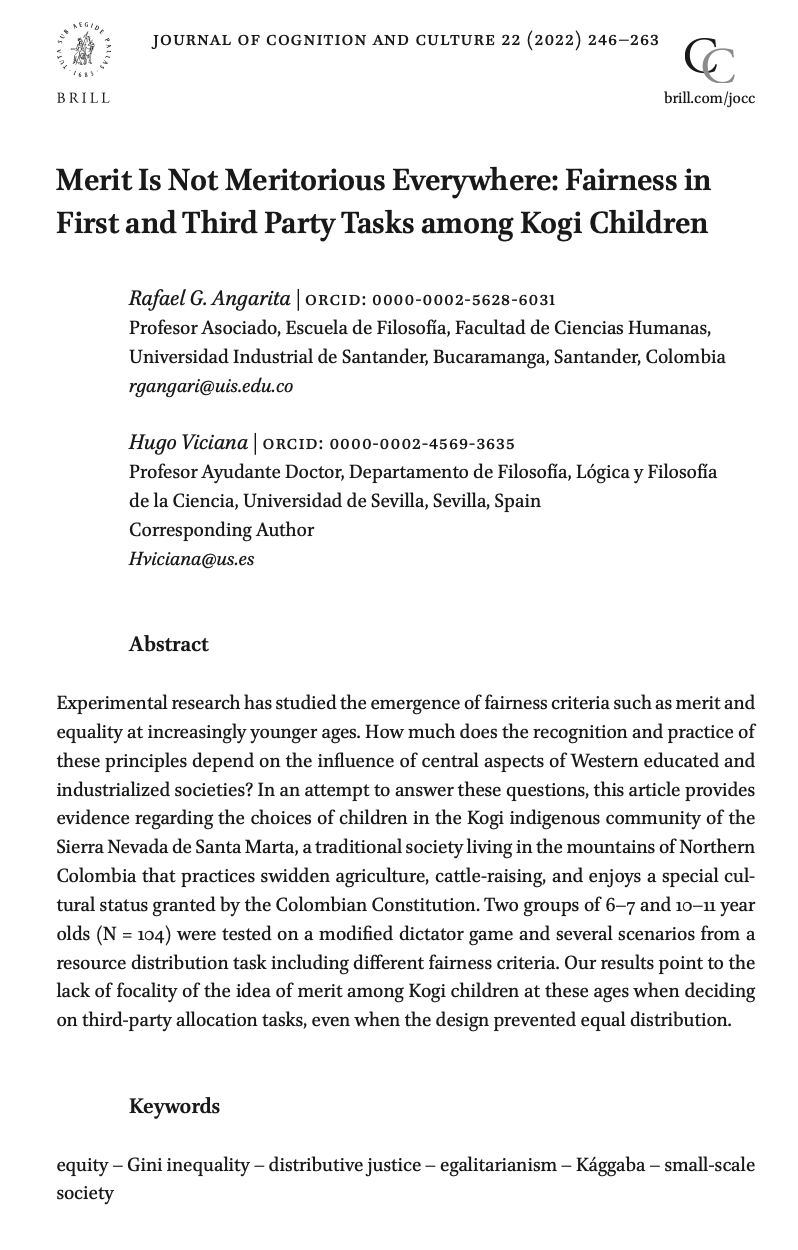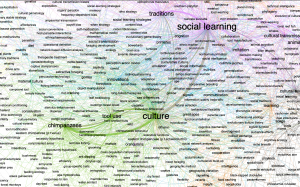
Hi there. I am an Emergia talent attraction research fellow working at the intersection of philosophy and the cognitive and behavioral sciences.
I am currently based at the Departamento de Filosofía, Lógica y Filosofía de la Ciencia, Universidad de Sevilla, while also holding a Visiting Scholar appointment at the Sage School of Philosophy, Cornell University. Previously I have held research or teaching positions at the University of Paris 1 Panthéon-Sorbonne, the Institute for Advanced Social Studies of the Spanish National Research Council (IESA-CSIC), the Instituto de Filosofia (IFS-CSIC), the Institut de Recherche pour le Développement (IRD-Paris), the Psychology Department of the University of the Balearic Islands, and the University of Malaga. I have also been a visiting researcher at several institutions including the Center for Behavior, Evolution, and Culture at the University of California Los Angeles, and the Social Norms group at the Philosophy, Politics, and Economics Program at UPenn.
You can scroll down and check some of my publications or visit ResearchGate to find preprints of most of them. And here is a list of some previous and current projects on my public profile on Open Science Framework. Feel free to write me a mail [name.surname@gmail] or private message me in twitter.
Viciana, Hugo; Astobiza, Aníbal M; Fasce, Angelo; Hannikainen, Ivar R.
Scientifically together, politically apart? Epistemological literacy predicts updating on contested science issues Journal Article Forthcoming
In: Draft, Forthcoming.
Links | BibTeX | Tags: Cultural Cognition, Disagreements, Dissent and disputes, Nature of Science, Polarization, Pseudoscience, Science denial, Scientific literacy, Socioscientific controversies, Spain
@article{nokey,
title = {Scientifically together, politically apart? Epistemological literacy predicts updating on contested science issues},
author = {Hugo Viciana and Aníbal M Astobiza and Angelo Fasce and Ivar R. Hannikainen},
url = {https://osf.io/preprints/psyarxiv/va2pd},
doi = {https://doi.org/10.31234/osf.io/va2pd},
year = {2024},
date = {2024-05-29},
urldate = {2024-05-29},
journal = {Draft},
keywords = {Cultural Cognition, Disagreements, Dissent and disputes, Nature of Science, Polarization, Pseudoscience, Science denial, Scientific literacy, Socioscientific controversies, Spain},
pubstate = {forthcoming},
tppubtype = {article}
}
Viciana, Hugo; Gaitán, Antonio; Aguiar, Fernando (Ed.)
Experiments in Moral and Political Philosophy Book
Routledge, 2023, ISBN: 9781032293905.
Abstract | Links | BibTeX | Tags: Experimental Philosophy
@book{nokey,
title = {Experiments in Moral and Political Philosophy},
editor = {Hugo Viciana and Antonio Gaitán and Fernando Aguiar },
url = {https://www.routledge.com/Experiments-in-Moral-and-Political-Philosophy/Viciana-Gaitan-Aguiar/p/book/9781032293905},
isbn = {9781032293905},
year = {2023},
date = {2023-08-03},
urldate = {2023-08-03},
publisher = {Routledge},
abstract = {This volume presents new research on the use of experimental methodologies in moral and social philosophy. The contributions reflect the growing plurality of methodologies and strategies for implementing experimental work on morality to new domains, problems, and topics.
Philosophers are exploring the ways in which empirical approaches can transform our idea of the good, our understanding of the social nature of norms and morality, as well as our methods of fulfilling ethical goals. The chapters in this volume extend experimental work on morality to previously underexplored areas. The contributions in Part 1 explore the methods and foundations of experimental work in areas such as folk moral judgments, metaethical beliefs, moral explanations, and reflective equilibrium. Part 2 focuses on issues in normative ethics, legal, and political philosophy such as virtue ethics, utilitarianism, theories of justice, and criminal responsibility. Finally, the chapters in Part 3 tackle various applied ethical issues including feminist X-Phi, animal welfare, experimental bioethics, and self-driving cars.
Experiments in Moral and Political Philosophy will be of interest to scholars and advanced students working in ethics, applied ethics, experimental philosophy, social and political philosophy, and philosophy of law.},
keywords = {Experimental Philosophy},
pubstate = {published},
tppubtype = {book}
}
Philosophers are exploring the ways in which empirical approaches can transform our idea of the good, our understanding of the social nature of norms and morality, as well as our methods of fulfilling ethical goals. The chapters in this volume extend experimental work on morality to previously underexplored areas. The contributions in Part 1 explore the methods and foundations of experimental work in areas such as folk moral judgments, metaethical beliefs, moral explanations, and reflective equilibrium. Part 2 focuses on issues in normative ethics, legal, and political philosophy such as virtue ethics, utilitarianism, theories of justice, and criminal responsibility. Finally, the chapters in Part 3 tackle various applied ethical issues including feminist X-Phi, animal welfare, experimental bioethics, and self-driving cars.
Experiments in Moral and Political Philosophy will be of interest to scholars and advanced students working in ethics, applied ethics, experimental philosophy, social and political philosophy, and philosophy of law.
Angarita-Cáceres, Rafael G; Viciana, Hugo
Merit is not meritorious everywhere: Fairness in first and third-party tasks among Kogi children Journal Article
In: Journal of Cognition and Culture, vol. 22, iss. 3-4, 2022.
Abstract | Links | BibTeX | Tags: Anthropology, Cultural Cognition, Moral development, Moral psychology
@article{caceresmerit,
title = {Merit is not meritorious everywhere: Fairness in first and third-party tasks among Kogi children},
author = {Rafael G Angarita-Cáceres and Hugo Viciana},
url = {https://psyarxiv.com/fy9mp/},
year = {2022},
date = {2022-09-01},
urldate = {2022-09-01},
journal = {Journal of Cognition and Culture},
volume = {22},
issue = {3-4},
publisher = {PsyArXiv},
abstract = {Experimental research has studied the emergence of fairness criteria such as merit and equality at increasingly younger ages. How much does the recognition and practice of these principles depend on the influence of central aspects of Western educated and industrialized societies? In an attempt to answer these questions, this research report provides evidence regarding the choices of children in the Kogi indigenous community of the Sierra Nevada de Santa Marta, a small-scale society living in the mountains of Northern Colombia that practices swidden agriculture, cattle-raising, and enjoys a special cultural status granted by the Colombian Constitution. Two groups of 6-7 and 10-11 year olds (N=104) were tested on a modified dictator game and several scenarios from a resource distribution task including different fairness criteria. Our results point to the lack of focality of the idea of merit among Kogi children at these ages when deciding on third-party allocation tasks, even when the experimental design prevented equal distribution.},
keywords = {Anthropology, Cultural Cognition, Moral development, Moral psychology},
pubstate = {published},
tppubtype = {article}
}
Viciana, Hugo
Animal culture: But of which kind? Journal Article
In: Studies in History and Philosophy of Science Part A, vol. 90, pp. 208–218, 2021.
Abstract | Links | BibTeX | Tags: Animal behaviour, Definition of culture, Eliminativism, Natural kinds, Social learning, Text mining
@article{viciana2021animal,
title = {Animal culture: But of which kind?},
author = {Hugo Viciana},
url = {https://www.sciencedirect.com/science/article/pii/S0039368121001680},
year = {2021},
date = {2021-01-01},
urldate = {2021-01-01},
journal = {Studies in History and Philosophy of Science Part A},
volume = {90},
pages = {208--218},
publisher = {Elsevier},
abstract = {Is animal culture a real entity or is it rather just in the eye of the beholder? The concept of culture began to be increasingly used in the context of animal behaviour research around the 1960s. Despite its success, it is not clear that it represents what philosophers have traditionally thought to be a natural kind. In this article I will show, however, how conceiving of animal culture in this fashion has played a role in the “culture wars”, and what lessons we can draw from this. First, an analysis of the epistemological landscape of author keywords related to the concept of animal cultures is presented, thus vindicating the centrality of the concept in describing a broad range of findings. A minimal definition that encompasses the multiple strands of research incorporating the notion of culture is proposed. I then systematically enumerate the ways in which culture thus conceived cannot be considered a natural kind in the study of animal behaviour. This is accomplished by reviewing the efforts and possibilities of anchoring the elusive idea in specific mechanisms, homologies, selection pressures, homeostatic property clusters, or alternatively, its reduction or elimination. Finally, a plausible interpretation of the scientific status of the animal culture concept is suggested that is compatible with both its well established use in animal behaviour research and its inferential limitations. Culture plays the role of a well-established epistemic kind, a node that connects different areas of research on common themes.},
keywords = {Animal behaviour, Definition of culture, Eliminativism, Natural kinds, Social learning, Text mining},
pubstate = {published},
tppubtype = {article}
}
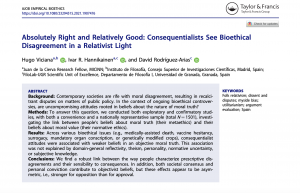
Viciana, Hugo; Hannikainen, Ivar R; Rodriguez-Arias, David
Absolutely right and relatively good: Consequentialists see bioethical disagreement in a relativist light Journal Article
In: AJOB empirical bioethics, vol. 12, no. 3, pp. 190–205, 2021.
Abstract | Links | BibTeX | Tags: argument evaluation, Dissent and disputes, Folk relativism, Myside bias, Spain, Utilitarianism
@article{viciana2021absolutely,
title = {Absolutely right and relatively good: Consequentialists see bioethical disagreement in a relativist light},
author = {Hugo Viciana and Ivar R Hannikainen and David Rodriguez-Arias},
url = {https://www.tandfonline.com/doi/abs/10.1080/23294515.2021.1907476},
year = {2021},
date = {2021-01-01},
urldate = {2021-01-01},
journal = {AJOB empirical bioethics},
volume = {12},
number = {3},
pages = {190--205},
publisher = {Taylor & Francis},
abstract = {Background: Contemporary societies are rife with moral disagreement, resulting in recalcitrant disputes on matters of public policy. In the context of ongoing bioethical controversies, are uncompromising attitudes rooted in beliefs about the nature of moral truth? Methods: To answer this question, we conducted both exploratory and confirmatory stud- ies, with both a convenience and a nationally representative sample (total N 1⁄4 1501), investigating the link between people’s beliefs about moral truth (their metaethics) and their beliefs about moral value (their normative ethics).
Results: Across various bioethical issues (e.g., medically-assisted death, vaccine hesitancy, surrogacy, mandatory organ conscription, or genetically modified crops), consequentialist attitudes were associated with weaker beliefs in an objective moral truth. This association was not explained by domain-general reflectivity, theism, personality, normative uncertainty, or subjective knowledge.
Conclusions: We find a robust link between the way people characterize prescriptive disagreements and their sensibility to consequences. In addition, both societal consensus and personal conviction contribute to objectivist beliefs, but these effects appear to be asymmetric, i.e., stronger for opposition than for approval.},
keywords = {argument evaluation, Dissent and disputes, Folk relativism, Myside bias, Spain, Utilitarianism},
pubstate = {published},
tppubtype = {article}
}
Results: Across various bioethical issues (e.g., medically-assisted death, vaccine hesitancy, surrogacy, mandatory organ conscription, or genetically modified crops), consequentialist attitudes were associated with weaker beliefs in an objective moral truth. This association was not explained by domain-general reflectivity, theism, personality, normative uncertainty, or subjective knowledge.
Conclusions: We find a robust link between the way people characterize prescriptive disagreements and their sensibility to consequences. In addition, both societal consensus and personal conviction contribute to objectivist beliefs, but these effects appear to be asymmetric, i.e., stronger for opposition than for approval.
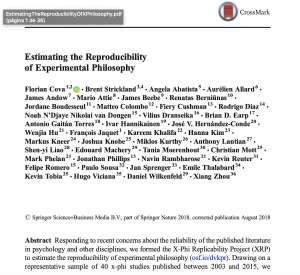
Cova, Florian; Strickland, Brent; others,
Estimating the reproducibility of experimental philosophy Journal Article
In: Review of Philosophy and Psychology, vol. 12, no. 1, pp. 9–44, 2021.
Abstract | Links | BibTeX | Tags: Experimental Philosophy, Replicability, Reproducibility
@article{cova2021estimating,
title = {Estimating the reproducibility of experimental philosophy},
author = {Florian Cova and Brent Strickland and others},
url = {https://www.researchgate.net/publication/325216701_Estimating_the_Reproducibility_of_Experimental_Philosophy},
year = {2021},
date = {2021-01-01},
urldate = {2021-01-01},
journal = {Review of Philosophy and Psychology},
volume = {12},
number = {1},
pages = {9--44},
publisher = {Springer},
abstract = {Responding to recent concerns about the reliability of the published literature in psychology and other disciplines, we formed the X-Phi Replicability Project (XRP) to estimate the reproducibility of experimental philosophy (osf.io/dvkpr). Drawing on a representative sample of 40 x-phi studies published between 2003 and 2015, we enlisted 20 research teams across 8 countries to conduct a high-quality replication of each study in order to compare the results to the original published findings. We found that x-phi studies – as represented in our sample – successfully replicated about 70% of the time. We discuss possible reasons for this relatively high replication rate in the field of experimental philosophy and offer suggestions for best research practices going forward.},
keywords = {Experimental Philosophy, Replicability, Reproducibility},
pubstate = {published},
tppubtype = {article}
}
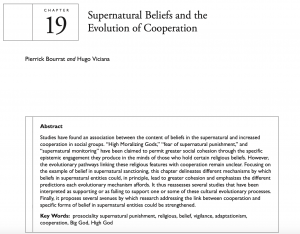
Bourrat, Pierrick; Viciana, Hugo
Supernatural Beliefs and the Evolution of Cooperation Book Chapter
In: pp. 297, Oxford University Press, 2020.
Abstract | Links | BibTeX | Tags: Adaptation, Belief, Big God, Cooperation, High God, Prosociality, Supernatural punishment
@inbook{bourrat202019,
title = {Supernatural Beliefs and the Evolution of Cooperation},
author = {Pierrick Bourrat and Hugo Viciana},
url = {https://www.researchgate.net/publication/294088802_Supernatural_Beliefs_and_the_Evolution_of_Cooperation},
year = {2020},
date = {2020-06-01},
urldate = {2020-06-01},
journal = {The Oxford Handbook of Evolutionary Psychology and Religion},
pages = {297},
publisher = {Oxford University Press},
abstract = {Studies have found an association between the content of beliefs in the supernatural and increased cooperation in social groups. “High Moralizing Gods,” “fear of supernatural punishment,” and “supernatural monitoring” have been claimed to permit greater social cohesion through the specific epistemic engagement they produce in the minds of those who hold certain religious beliefs. However, the evolutionary pathways linking these religious features with cooperation remain unclear. Focusing on the example of belief in supernatural sanctioning, this chapter delineates different mechanisms by which beliefs in supernatural entities could, in principle, lead to greater cohesion and emphasizes the different predictions each evolutionary mechanism affords. It thus reassesses several studies that have been interpreted as supporting or as failing to support one or some of these cultural evolutionary processes. Finally, it proposes several avenues by which research addressing the link between cooperation and specific forms of belief in supernatural entities could be strengthened.},
keywords = {Adaptation, Belief, Big God, Cooperation, High God, Prosociality, Supernatural punishment},
pubstate = {published},
tppubtype = {inbook}
}

Aguiar, Fernando; Gaitán, Antonio; Viciana, Hugo
Una introducción a la ética experimental: Problemas, enfoques y métodos Book
Ediciones Cátedra, 2020.
Abstract | Links | BibTeX | Tags: Cooperation, Dissent and disputes, Effects of teaching ethics, Experimental Philosophy, Fairness, Metaethics, Moral diversity, Social norms, Utilitarianism
@book{aguiar2020introduccion,
title = {Una introducción a la ética experimental: Problemas, enfoques y métodos},
author = {Fernando Aguiar and Antonio Gaitán and Hugo Viciana},
url = {https://www.catedra.com/primer_capitulo/una-introduccion-a-la-etica-experimental.pdf},
year = {2020},
date = {2020-01-01},
urldate = {2020-01-01},
publisher = {Ediciones Cátedra},
abstract = {En el terreno de la moral, el contraste entre lo que el filósofo Wilfrid Sellars denominó "la imagen manifiesta" y la "imagen científica" es enorme y tiene unas consecuencias prácticas ineludibles. Este libro reduce la distancia entre esa imagen manifiesta y la imagen científica, dotando al lector de referencias fundamentales, enfoques diversos y un amplio abanico de temáticas a partir de investigaciones experimentales sobre nuestra conducta moral.},
keywords = {Cooperation, Dissent and disputes, Effects of teaching ethics, Experimental Philosophy, Fairness, Metaethics, Moral diversity, Social norms, Utilitarianism},
pubstate = {published},
tppubtype = {book}
}
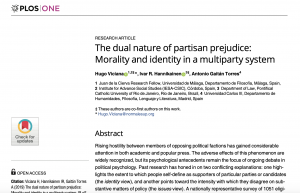
Viciana, Hugo; Hannikainen, Ivar R; Torres, Antonio Gaitan
The dual nature of partisan prejudice: Morality and identity in a multiparty system Journal Article
In: PloS one, vol. 14, no. 7, pp. e0219509, 2019.
Abstract | Links | BibTeX | Tags: Affective polarization, Experimental Philosophy, Metaethics, Moral absolutism, Outgroup misperception, Partyism
@article{viciana2019dual,
title = {The dual nature of partisan prejudice: Morality and identity in a multiparty system},
author = {Hugo Viciana and Ivar R Hannikainen and Antonio Gaitan Torres},
url = {https://journals.plos.org/plosone/article?id=10.1371/journal.pone.0219509},
year = {2019},
date = {2019-01-01},
urldate = {2019-01-01},
journal = {PloS one},
volume = {14},
number = {7},
pages = {e0219509},
publisher = {Public Library of Science San Francisco, CA USA},
abstract = {Rising hostility between members of opposing political factions has gained considerable attention in both academic and popular press. The adverse effects of this phenomenon are widely recognized, but its psychological antecedents remain the focus of ongoing debate in political psychology. Past research has honed in on two conflicting explanations: one highlights the extent to which people self-define as supporters of particular parties or candidates (the identity view), and another points toward the intensity with which they disagree on substantive matters of policy (the issues view). A nationally representative survey of 1051 eligible Spanish voters yielded support for both explanations. The perceived magnitude and nature of disagreement were associated with increased partisan prejudice, while controlling for partisan identification. Path analyses revealed that issue-based prejudice was more pronounced among ideologically extreme agents (β = 0.237, 95% CI [0.174, 0.300]) than toward extreme targets (β = 0.140, 95% CI [0.078, 0.201]), and replicated recent findings that identity-based prejudice is motivated primarily by non-instrumental factors (β = 0.286, 95% CI [0.230, 0.337]). Together, these results indicate that discrimination across party lines responds to two fundamentally distinct, though at times co-occurring, imperatives: to coalesce in ideologically homogeneous communities, and to protect one’s sense of partisan identity.},
keywords = {Affective polarization, Experimental Philosophy, Metaethics, Moral absolutism, Outgroup misperception, Partyism},
pubstate = {published},
tppubtype = {article}
}
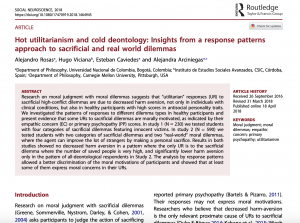
Rosas, Alejandro; Viciana, Hugo; Caviedes, Esteban; Arciniegas, Alejandra
Hot utilitarianism and cold deontology: Insights from a response patterns approach to sacrificial and real world dilemmas Journal Article
In: Social Neuroscience, vol. 14, no. 2, pp. 125–135, 2019.
BibTeX | Tags:
@article{rosas2019hot,
title = {Hot utilitarianism and cold deontology: Insights from a response patterns approach to sacrificial and real world dilemmas},
author = {Alejandro Rosas and Hugo Viciana and Esteban Caviedes and Alejandra Arciniegas},
year = {2019},
date = {2019-01-01},
urldate = {2019-01-01},
journal = {Social Neuroscience},
volume = {14},
number = {2},
pages = {125--135},
publisher = {Taylor & Francis},
keywords = {},
pubstate = {published},
tppubtype = {article}
}
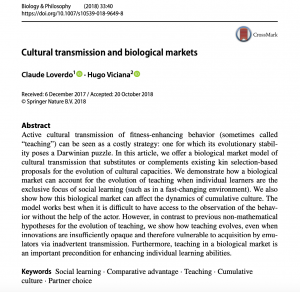
Loverdo, Claude; Viciana, Hugo
Cultural transmission and biological markets Journal Article
In: Biology & Philosophy, vol. 33, no. 5, pp. 1–19, 2018.
BibTeX | Tags:
@article{loverdo2018cultural,
title = {Cultural transmission and biological markets},
author = {Claude Loverdo and Hugo Viciana},
year = {2018},
date = {2018-01-01},
urldate = {2018-01-01},
journal = {Biology & Philosophy},
volume = {33},
number = {5},
pages = {1--19},
publisher = {Springer},
keywords = {},
pubstate = {published},
tppubtype = {article}
}
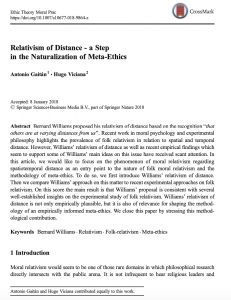
Gaitán, Antonio; Viciana, Hugo
Relativism of Distance-a Step in the Naturalization of Meta-Ethics Journal Article
In: Ethical Theory and Moral Practice, vol. 21, no. 2, pp. 311–327, 2018.
BibTeX | Tags:
@article{gaitan2018relativism,
title = {Relativism of Distance-a Step in the Naturalization of Meta-Ethics},
author = {Antonio Gaitán and Hugo Viciana},
year = {2018},
date = {2018-01-01},
urldate = {2018-01-01},
journal = {Ethical Theory and Moral Practice},
volume = {21},
number = {2},
pages = {311--327},
publisher = {Springer},
keywords = {},
pubstate = {published},
tppubtype = {article}
}
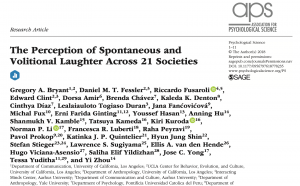
Bryant, Gregory A; Fessler, Daniel MT; Fusaroli, Riccardo; Clint, Edward; others,
The perception of spontaneous and volitional laughter across 21 societies Journal Article
In: Psychological science, vol. 29, no. 9, pp. 1515–1525, 2018.
BibTeX | Tags:
@article{bryant2018perception,
title = {The perception of spontaneous and volitional laughter across 21 societies},
author = {Gregory A Bryant and Daniel MT Fessler and Riccardo Fusaroli and Edward Clint and others},
year = {2018},
date = {2018-01-01},
urldate = {2018-01-01},
journal = {Psychological science},
volume = {29},
number = {9},
pages = {1515--1525},
publisher = {Sage Publications Sage CA: Los Angeles, CA},
keywords = {},
pubstate = {published},
tppubtype = {article}
}
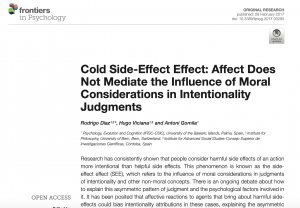
Diaz, Rodrigo; Viciana, Hugo; Gomila, Antoni
Cold side-effect effect: Affect does not mediate the influence of moral considerations in intentionality judgments Journal Article
In: Frontiers in psychology, vol. 8, pp. 295, 2017.
BibTeX | Tags:
@article{diaz2017cold,
title = {Cold side-effect effect: Affect does not mediate the influence of moral considerations in intentionality judgments},
author = {Rodrigo Diaz and Hugo Viciana and Antoni Gomila},
year = {2017},
date = {2017-01-01},
urldate = {2017-01-01},
journal = {Frontiers in psychology},
volume = {8},
pages = {295},
publisher = {Frontiers},
keywords = {},
pubstate = {published},
tppubtype = {article}
}
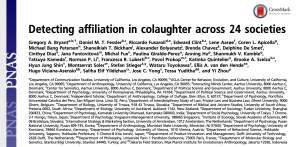
Bryant, Gregory A; Fessler, Daniel MT; Fusaroli, Riccardo; Clint, Edward; Aarøe, Lene; Apicella, Coren L; Petersen, Michael Bang; Bickham, Shaneikiah T; Bolyanatz, Alexander; Chavez, Brenda; others,
Detecting affiliation in colaughter across 24 societies Journal Article
In: Proceedings of the National Academy of Sciences, vol. 113, no. 17, pp. 4682–4687, 2016.
BibTeX | Tags:
@article{bryant2016detecting,
title = {Detecting affiliation in colaughter across 24 societies},
author = {Gregory A Bryant and Daniel MT Fessler and Riccardo Fusaroli and Edward Clint and Lene Aarøe and Coren L Apicella and Michael Bang Petersen and Shaneikiah T Bickham and Alexander Bolyanatz and Brenda Chavez and others},
year = {2016},
date = {2016-01-01},
urldate = {2016-01-01},
journal = {Proceedings of the National Academy of Sciences},
volume = {113},
number = {17},
pages = {4682--4687},
publisher = {Proceedings of the National Academy of Sciences},
keywords = {},
pubstate = {published},
tppubtype = {article}
}

Viciana, Hugo
¿Por qué somos morales? Introducción a la ética naturalista Book
Amazon, Kindle Publishing, 2014.
Abstract | Links | BibTeX | Tags: Cooperation, Emotions, Experimental Philosophy, Machiavellian tit-for-tat, Market for morality, Metaethics, Moral judgment, Moral psychology, Moral wiggle room, Self Deception, Situationism, Status hierarchies
@book{viciana2014queb,
title = {¿Por qué somos morales? Introducción a la ética naturalista},
author = {Hugo Viciana},
url = {https://www.amazon.com/somos-morales-Introducci%C3%B3n-naturalista-Spanish-ebook/dp/B00NPXO398},
year = {2014},
date = {2014-01-01},
urldate = {2014-01-01},
publisher = {Amazon, Kindle Publishing},
abstract = {¿Que tiene que ver la obra de Charles Darwin con la ética? ¿De donde viene nuestro sentido del compromiso moral? ¿Es el altruismo un simple efecto de nuestros genes egoístas? ¿Como informan los nuevos descubrimientos en psicología moral acerca de nuestros comportamientos en los mercados? Estas y otras preguntas son abordadas en ¿Por qué somos morales? Una introducción a la ética naturalista. Escrita en un lenguaje accesible, la obra recopila a lo largo de seis capítulos una gran cantidad de información acerca de los descubrimientos en psicología moral, dinámicas evolutivas y filosofía experimental.},
keywords = {Cooperation, Emotions, Experimental Philosophy, Machiavellian tit-for-tat, Market for morality, Metaethics, Moral judgment, Moral psychology, Moral wiggle room, Self Deception, Situationism, Status hierarchies},
pubstate = {published},
tppubtype = {book}
}
